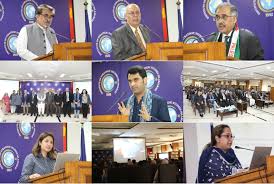Ex-US president Carter, trailblazing champion of Palestinians’ rights, dies — aged 100
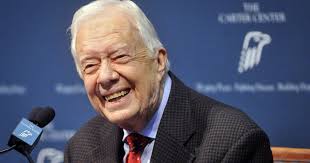
New York: Jimmy Carter, the first and only US president to identify Israeli apartheid and an advocate of Palestinians’ political rights, died Sunday at the age of 100.
Despite serving only one term, the former peanut farmer from the US state of Georgia cast a long shadow during his post-presidential career. This included winning the Nobel Prize for Peace in 2002 for The Carter Center’s work in fighting the Guinea worm disease in Africa and tracking elections across the world.
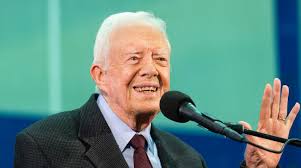
The Council on American-Islamic Relations (CAIR), a prominent Muslim advocacy organization, paid tributes to Carter, saying he was a “champion for many just causes, including Palestinian freedom and was a friend of the Muslim community.
In a statement, CAIR National Executive Director Nihad Awad said: “President Carter was a friend of the American Muslim community and a champion for many just causes, including Palestinian freedom. Even when President Carter faced vitriolic attacks from anti-Palestinian groups for his prescient book ‘Palestine: Peace, Not Apartheid,’ he stood firm.
“He was a humanitarian role model, and we pray that a new generation of political leaders will take inspiration from his legacy.”
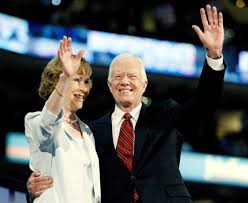
Carter, who lived long enough to become the oldest president in US history, “died peacefully Sunday, Dec. 29, at his home in Plains, Georgia, surrounded by his family,” the Carter Center announced in a statement.
No cause of death was immediately given, although Carter had spent almost two years under hospice care at his home after being treated for a form of skin cancer. He celebrated his 100th birthday at his home in October.
“My father was a hero, not only to me but to everyone who believes in peace, human rights, and unselfish love,” said Chip Carter, the former president’s son, in a statement provided by the Carter Center.
“My brothers, sister, and I shared him with the rest of the world through these common beliefs. The world is our family because of the way he brought people together, and we thank you for honoring his memory by continuing to live these shared beliefs.”
There will be public observances in Atlanta and Washington, D.C., followed by a private interment in Plains, Georgia, the Carter Center said.
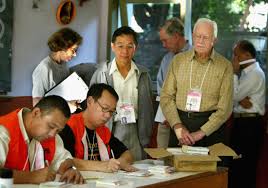
The Carter Center said in February 2023 that he had “decided to spend his remaining time at home with his family and receive hospice care instead of additional medical intervention.”
“My father was a hero, not only to me but to everyone who believes in peace, human rights, and unselfish love,” said Chip Carter, the former president’s son, in a statement provided by the Carter Center.
“My brothers, sister, and I shared him with the rest of the world through these common beliefs. The world is our family because of the way he brought people together, and we thank you for honouring his memory by continuing to live these shared beliefs.”
There will be public observances in Atlanta and Washington, D.C., followed by a private interment in Plains, Georgia, the Carter Center said.
Today some right-leaning politicians still deride the Carter years but as the decades passed, his humanitarian efforts and simple lifestyle began to shape a new legacy for many Americans.
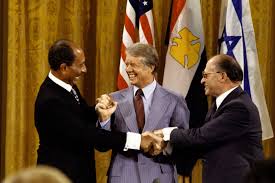
After leaving the White House, he became the first and only president to return full-time to the house he lived in before politics – a humble, two-bedroom ranch-style home where he lived with his wife of 77 years, Rosalynn Carter. The former first lady, 96, died on Nov. 19, 2023.
Carter chose not to pursue the lucrative after-dinner speeches and publishing deals awaiting most former presidents, telling the Washington Post in 2018 that he never really wanted to be rich.
Instead, he spent his remaining years trying to address global problems of inequality and disease.
He also teamed up with Nelson Mandela to found The Elders, a group of global leaders who committed themselves to work on peace and human rights.
Carter’s journey to the White House began in the small town of Plains, Georgia, where he was born October 1, 1924.
After serving as an officer in the U.S. Navy, where he helped develop the post-World War II nuclear submarine fleet, Carter returned to his hometown in 1953 to run the family peanut-farming business.
He entered politics in the 1960s, serving two terms as a Georgia legislator before becoming the state’s 76th governor from 1971 to 1975.
In the 1976 presidential election, Carter, a Democrat, ran against Republican incumbent Gerald Ford, who assumed the presidency after Richard Nixon resigned in the wake of the Watergate scandal. Carter narrowly defeated Ford to become president.
The high point of Carter’s presidency came in 1978. Carter brought Egyptian President Anwar Sadat and Israeli Prime Minister Menachem Begin to the Camp David presidential retreat in rural Maryland to negotiate a peace treaty.
“When I became president, there had been four wars between Arabs and Israelis in the previous 25 years, with the Egyptians in the leadership supported by the Soviet Union,” he said. “They were the only country that could really challenge Israel militarily. And we had success in getting a treaty between Israel and Egypt … not a word of which has ever been violated.”
Carter also negotiated a treaty turning control of the Panama Canal over to the Panamanian government and normalized diplomatic relations with the People’s Republic of China.
But in 1979 the primary focus for Carter’s administration turned to Iran, where a revolution led by religious clerics toppled the government of the U.S. backed Shah of Iran, who eventually fled to the United States, where he received treatment for cancer.
On November 4, 1979, militants angry with the U.S. for harbouring the deposed Shah, stormed the U.S. Embassy in Tehran, taking 66 Americans hostage, 13 were released weeks later.
Five months into the crisis, in April 1980, Carter authorized a complex military operation to free the remaining hostages. Dubbed Operation Eagle Claw, the plan called for several helicopters and military aircraft to stage at a site in the Iranian desert. Carter, who approved the plan, explained that the helicopters carrying members of the U.S. military’s elite Delta Force, were to fly from there to the U.S. embassy in Tehran, free the hostages and return to the waiting aircraft that would fly them out of Iran.
“The minimum number of helicopters required would be six very large helicopters. So I decided to send eight. One of the helicopters, in an inexplicable way, turned around and went back to the aircraft carrier. Another one went down in a sandstorm in the Iranian desert. The third one developed a hydraulic leak and ran into one of the C-130 airplanes,” he said.
The aborted mission ended in failure. Eight U.S. military members and one Iranian civilian died as a result of the crash. Walter Mondale, Carter’s vice president, called that day as the lowest point of their administration.
The failure of the mission damaged Carter’s credibility with the American public. The incident occurred seven months before the 1980 presidential election and contributed to Carter’s defeat to challenger Ronald Reagan, a Republican.
“The exact anniversary of the hostages being taken was Election Day,” Carter said. “Of course, the news media were completely obsessed with the anniversary of the hostages being taken and the fact that I had not been able to get them out. That was the number one issue that caused me to fail.” The hostages were freed the day Reagan became president.



